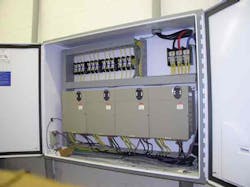Additional Schneider components include eight Telemecanique Altivar variable frequency drives (VFDs) for motors that operate car wash dryers, blower panels and water pressure controls, as well as a motor control center equipped with a Telemecanique Advantys distributed input/output (I/O) system that connects to the PLC via a CANopen (for Controller Area Network) link. Various sensors are used to detect vehicle presence, soap solution tank levels, hydraulic system fluid levels and other parameters, and the system can automatically make adjustments or alert the operator when action is needed.
For more information search keywords “Web-based monitoring,” “Web-based control” and “Transparent Ready” at www.automationworld.com.
About the Author
By Wes Iversen
Managing Editor

Leaders relevant to this article:
